Next Article Best Breakfast Catering in Seattle: 14 Top Picks and Ideas
Corporate Catering Simplified: Your Ultimate Guide for Events and Meal Programs
-
 by Mark Piper
by Mark Piper - Jul 26, 2024
- 17 minutes
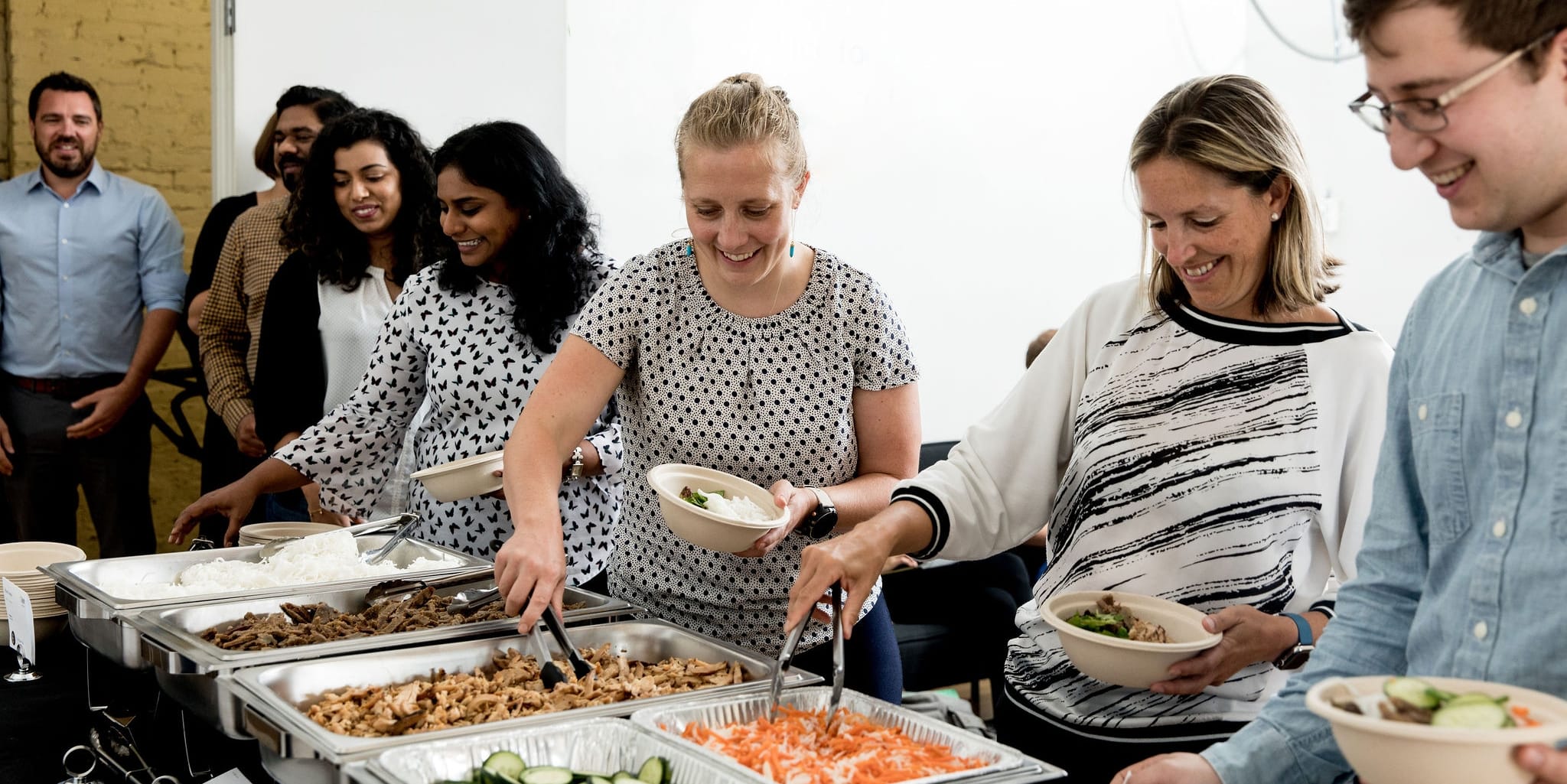
Catering to the Corporate World: An Introduction
What is Corporate Catering?
Corporate catering is a specialized culinary service designed specifically to provide food for employees and guests during corporate events, meetings, and daily office meals.
Imagine the convenience of having delicious, professionally prepared dishes delivered right into your company’s office, customized to the dietary preferences and requirements of your team. Caterers who are experts in serving the corporate sector understand the unique demands of corporate schedules and the importance of punctuality, food quality, and presentation that align with company values and expectations.
The Benefits of Catering to Employees
Catering to employees offers numerous advantages that can resonate well beyond the meals themselves. When you provide food, you’re also serving up a slice of appreciation, showing your workforce that their well-being is a priority. This investment in employees’ needs enhances company culture and is a significant morale booster plus recruiting perk.
Shared meals are a fundamental social activity. By catering for your employees, you foster an environment for collaboration. An informal setting encourages a free exchange of ideas, leading to the kind of team bonding and creative thinking that might not surface in typical tasks.
“Everyone understandably wants to build higher-performing, more cohesive teams… Researchers led by Kevin Kniffin of Cornell University, say they’ve found a deceptively simple method: Encourage teams to eat together.“
–Harvard Business Review
It’s not just about the intangibles, though. Catering saves employee time and money. It can boost overall employee health as well as company productivity all-in-one.
- In a survey of 1200 employees “more than of half said that a free lunch would strongly influence their decision to accept a job offer.”
–Forbes Magazine - “Providing lunch for employees is a no-brainer. It is an effective way of helping employees build meaningful relationships, it saves employees time, and everyone loves it.”
–Nick Huzar, CEO & Co-Founder, OfferUp
Key Reasons for Hiring a Professional Caterer
Hiring a professional caterer can elevate your corporate catering experience. Here’s why it’s an integral decision:
- Professional Expertise: Professional caterers bring their experience to the table, ensuring meals are prepared to a high standard, aligning to diverse groups and event themes.
- Time Efficiency: Leave the food to the experts, so that you’ll have more time to focus on your core functions rather than the logistics of food service.
- Cost-Effectiveness: Outsourcing to a catering company can often be more economical than self-organizing, because they have established procurement processes and can scale service to match the size and budget of your event.
- Variety and Customization: Caterers can tailor their offerings to meet dietary restrictions and preferences, ensuring no needs go neglected.
- Stress Reduction: Knowing a reliable team is handling the food allows you to approach the day with less stress and more confidence.
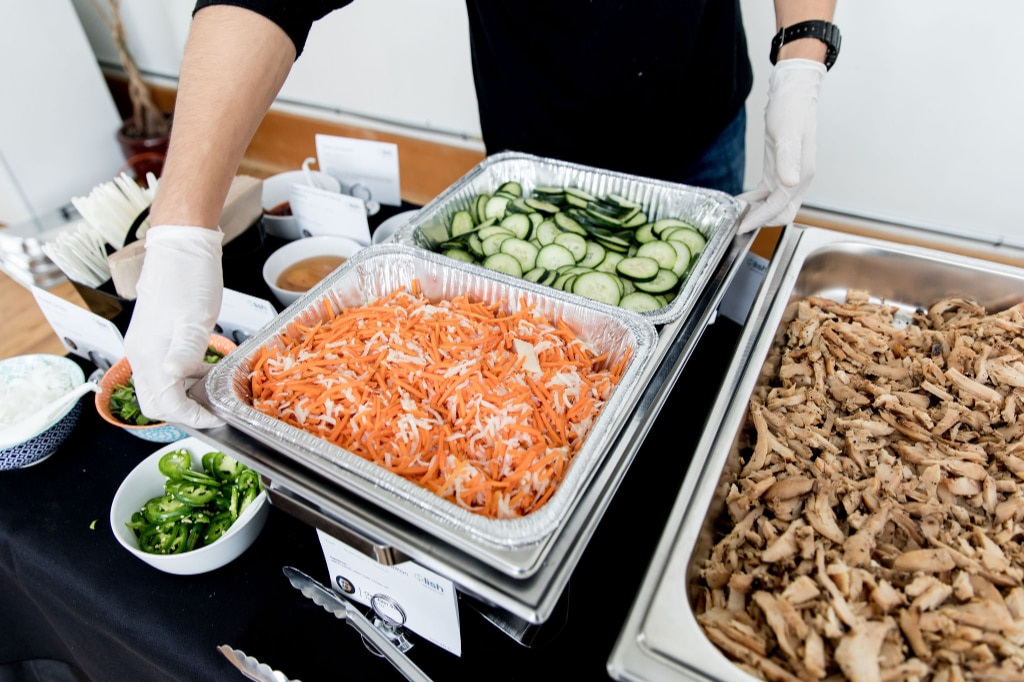
Crafting the Perfect Corporate Catering Experience
Recurring vs. On-Demand Catering
Understanding the difference between recurring and on-demand corporate catering is vital to choosing the right service for your company’s needs.
Recurring catering involves scheduled meal deliveries on a regular subscription basis, such as daily lunch for your team or weekly breakfast meetings. It’s an excellent way to streamline meal planning for ongoing events and ensure consistent quality and service. Recurring catering is synonymous with dependability; it’s setting a standard for what your team can expect, fostering a routine that employees can look forward to.
On-demand catering, by comparison, is suited for occasional needs, such as events, client meetings, corporate holidays, or last-minute gatherings. It provides flexibility to tailor to specific event requirements without a set schedule commitment.
| Recurring Catering | On-Demand Catering | |
| Daily, Weekly, or Monthly Commitment | No Set Schedule | |
| Valued Employee Benefit / Perk | Occasional Orders for Events | |
| Often a Dedicated Service Team | Variable Delivery/Service Personnel |
Deciding between the two comes down to the frequency, predictability, and nature of your corporate events. Whether it’s the structured approach of recurring catering or instead the flexibility of on-demand services, both options have their place in the corporate catering toolkit!
Types and Styles of Corporate Catering
Navigating through the various formats and styles of catering options can feel like a buffet of choices. Here’s a rundown that’ll help you pick a perfect match.
- Individual Orders: Ideal for small meetings or work sessions, individual boxed orders often also allow employees to select their preferred meal from a set menu. It’s a great way to cater to diverse tastes and dietary needs.
- Buffet-style: If you’re catering to a larger group (usually 15 people or more), buffet-style service is the preferred approach that invites attendees to explore a variety of dishes and pick among their preferences. Using chafers with sternos or buffet warmers keeps food hot during service while also adding a touch of class to tray-based catering.
- Platters: A mix of finger foods, sandwiches, pastries, or an array of desserts can create an informal, shareable dining experience, but options can be limited in comparison to buffet-style.
- Food Trucks: An exciting choice for outdoor events or casual gatherings, food trucks bring the novelty to you, offering everything from gourmet burgers to artisanal ice cream.
- Popups: For the feeling of dining out without leaving the office, a popup restaurant setup can provide a food-truck or dining like experience right in your office.
Not sure? Buffet-style is the catering classic — but your choice will depend on factors such as the number of people, the setting, budget, and the experience expected.
To subsidize, or not to subsidize?
The decision to subsidize corporate catering reflects the company’s dedication to its employees and consequently can significantly impact morale. Subsidizing means the company covers a portion or all of the meal costs, allowing employees to enjoy high-quality food at a reduced rate or for free. Here are the key elements to consider:
- Employee Satisfaction: Fully subsidizing meals is the best option to boost morale and show appreciation to employees, and can markedly improve retention and recruitment.
- Flexibility: Subsidizing corporate catering doesn’t have to be all or nothing. Offering to pay a fixed amount per individual, for instance $10 towards any lunch order, provides flexibility and can be easier on the budget.
- Budget Considerations: Budgeting is a balancing act between generosity and practicality. Carefully evaluate if your budget allows for a full or partial subsidy without straining your finances.
- Tax Implications: Understand the tax implications of subsidizing employee meals. It could be a deductible business expense, but it’s essential to know the laws applicable.
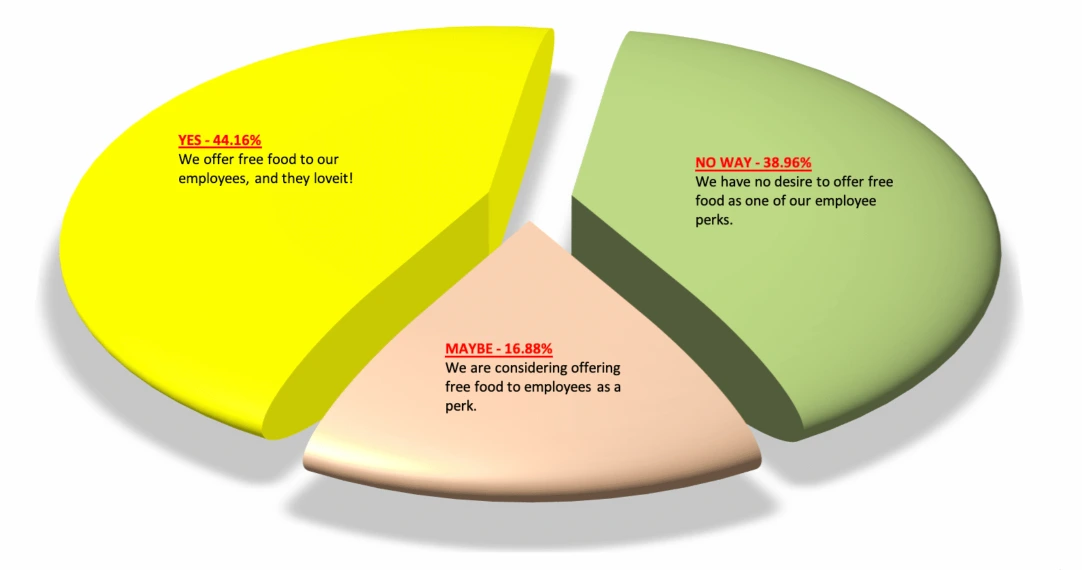
- 44.16% of companies surveyed provide free food to their employees. Additionally, 16.88% were considering free food as of 2019. –HR Bartender
“There is a free lunch, after all. It’s at the office. What was once an extra is now a necessity.”
–The New York Times
Food Choice is Key
Vendor Selection: Quality Meets Service
Selecting the right vendor is a cornerstone of success. The vendor should not only offer quality food but also complement it with exemplary service that stands up to the standards and expectations of your company. Here’s how you can ensure that quality meets service:
- Research Reputation: Look for caterers with strong reputations for both the quality of their food and their service. Online reviews and testimonials can give you insight into past performance and customer satisfaction.
- Evaluate Professionalism: A site visit can be telling. Observe the cleanliness of their operation, the demeanor of the staff, and how they handle food. Professionalism in these areas is generally a good indicator of what to expect. A venue walkthrough is another informative alternative.
- Check References: Ask for and follow up on references from the vendor. Speaking to others who have used the service can provide valuable insights into the reliability and consistency of the vendor.
- Assess Communication: Great communication is key to a successful partnership. Ensure that the vendor is easy to contact, responsive, and understands your needs and expectations.
- Consider Catering Service Providers: A new trend is catering service providers who work with multiple independent caterers, chefs, and restaurants. These service providers boost variety beyond what any single caterer can serve, while also often offering dedicated service.
At Lish, we work with over 50 vetted catering partners to bring you the best food in Seattle. We taste-test every menu we deliver, and assign you a dedicated service team. Your account manager curates meals to your team’s tastes, dietary needs, and budget. Your service team takes care of delivery and set-up, with optional cleanup and leftover donation.
By thoroughly vetting potential caterers, you can ensure that your event is supported by a vendor that provides high-quality food and outstanding service, making for an excellent experience.
“We have tried other catering services, and no one provides the high quality food, reliability, and professional service of Lish. They treat every company lunch like it’s a wedding day. They care about every detail.“
–Testimonial from Matt S., Office Manager at ZipWhip
Menu Planning: Balancing Options for Taste and Variety
Menu planning for corporate catering requires a fine balance between taste, variety, and accommodating diverse dietary needs. Here’s how to craft a menu that delights:
- Know Your Audience: Understand the preferences of your attendees. This includes dietary restrictions and food allergies. A survey in advance could help tailor the menu to your crowd. At Lish, we collect these preferences on your account and then can plan matching meals.
- Offer Variety: Aim for a wide range of options including vegetarian, vegan, and gluten-free choices to ensure there’s something for everyone. Cuisine variety matters too, so take care to rotate cuisines by popularity in a way that avoids getting stale. Watch out for spice level by pairing spicy dishes with milder alternatives, and keeping accompaniments that could be dietary issues on the side.
- Seasonal and Fresh: Choose vendors who incorporate seasonal ingredients for freshness and better taste, so they are at their peak in both flavor and nutrition.
- Themed Menus: Add excitement by creating themed menus that complement the event or the season. This can spark conversation and make the meal memorable and engaging for employees.
- Mindful Portions: Ensure that the portion serving sizes are appropriate – not too large to cause waste, but ample enough that everyone feels satisfied.
Balanced menu planning contributes significantly to the success of your event and the satisfaction of its attendees. Admin tasks, such as menu planning, are harder than they look!
👉 Lish offers catering experts who can plan for you, putting planning on auto-pilot.

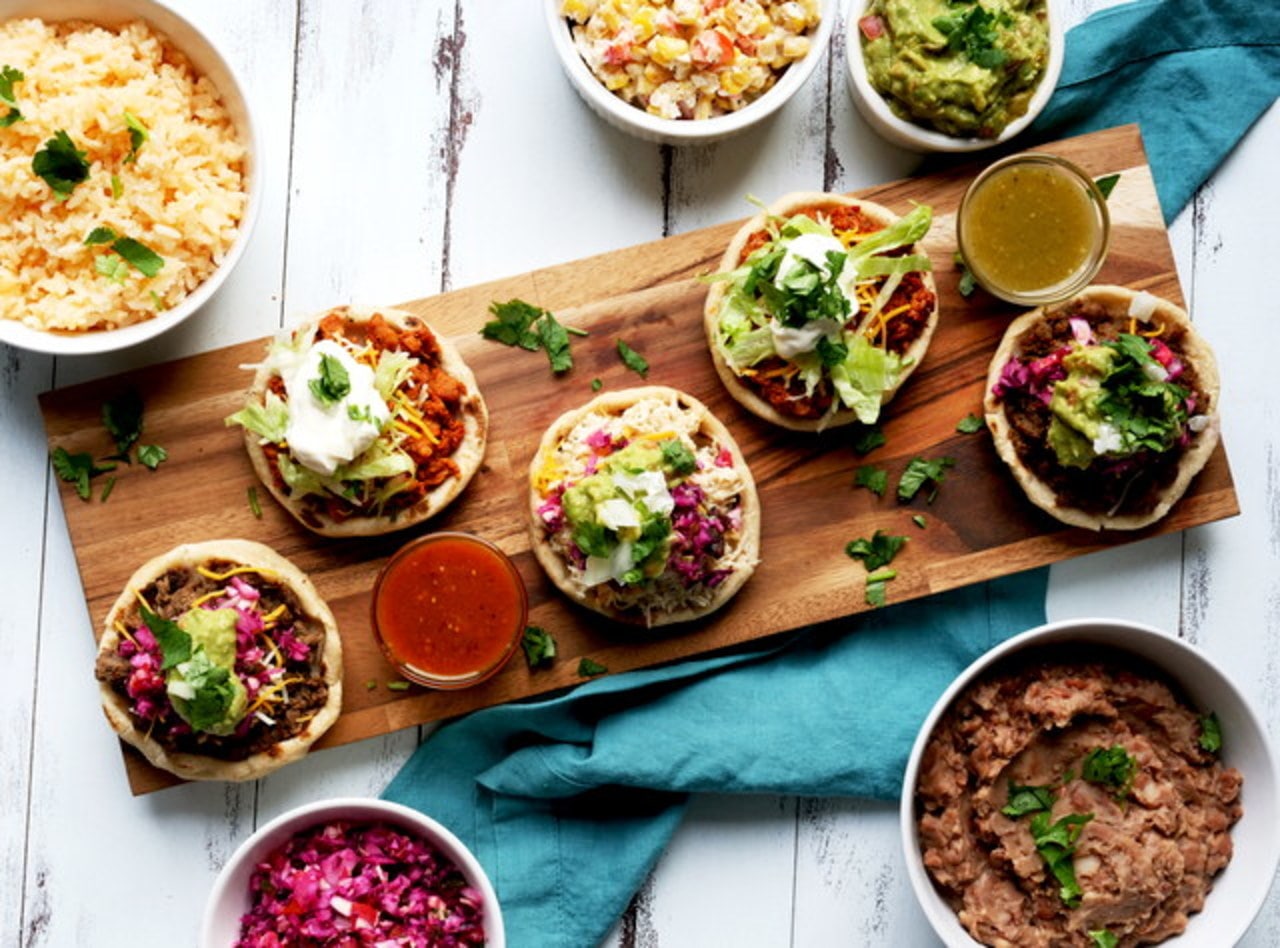
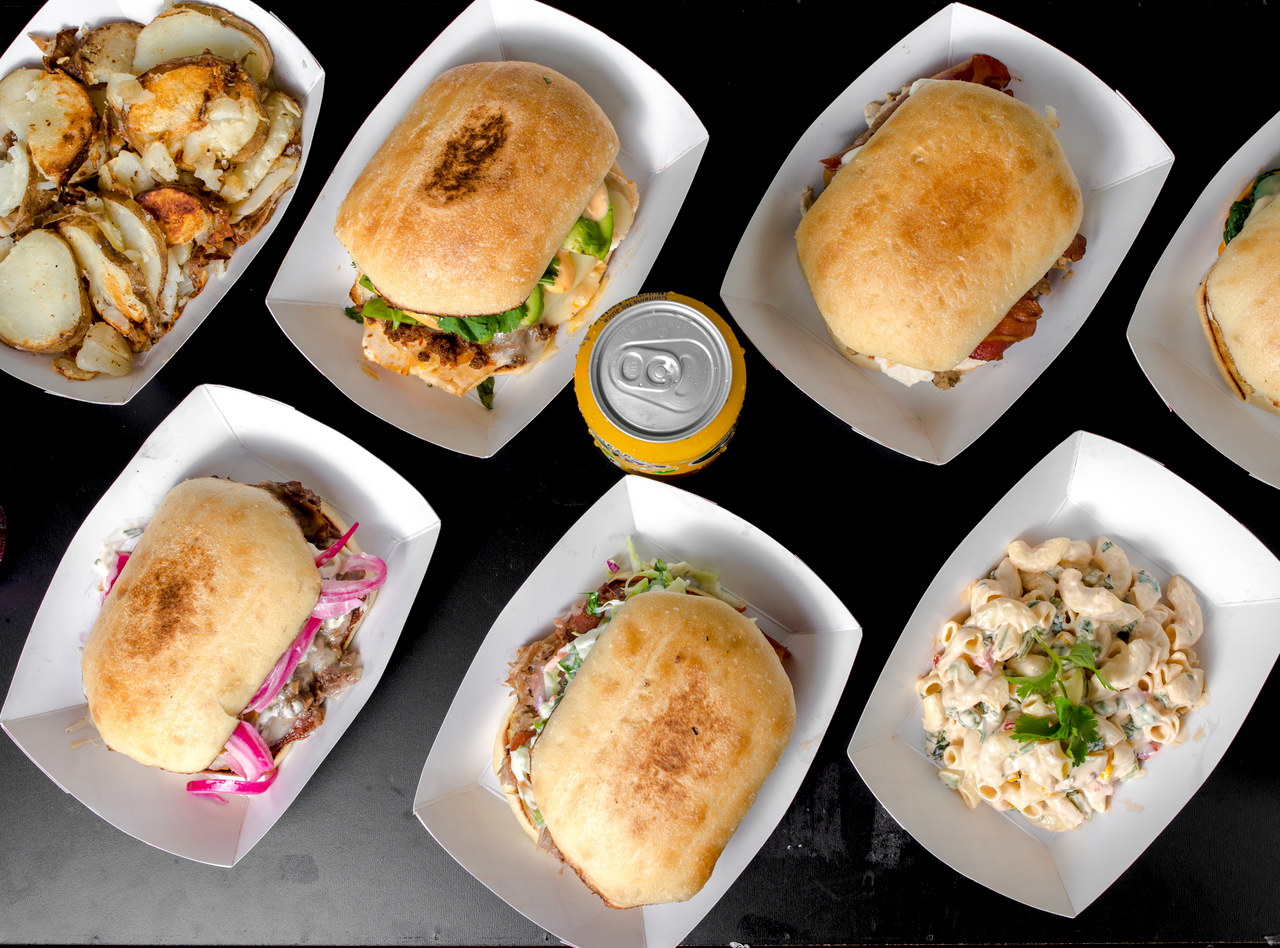
Food Quality: Dietary and Nutrition Considerations
Food quality, nutrition and dietary considerations are at the heart of modern corporate catering. To ensure everyone can eat well, here’s what to focus on:
- Dietary Restrictions: Clearly label dishes that are suitable for vegetarians, vegans, or those with gluten intolerance. Offer a range of dishes to ensure inclusivity.
“Clearly labeled allergens” was voted the most helpful menu characteristic by 42% of people surveyed.
—National Restaurant Association
- Balanced Offerings: Strive for a balance of protein, carbohydrates, and fats in each meal to support sustained energy levels throughout the day.
- Health Conscious: Aim for health-conscious options with lean proteins, avoiding menus that only feature heavy, greasy fare. A bounty of vegetables are especially key in providing nourishing choices that support wellness.
- Inform and Engage: Involve employees in the process by letting them suggest menu items or vote on options. Lish makes this easy by posting menus to your company calendar app or right in Slack, and collecting ratings from your team to plan more meals they love.
By paying close attention to both the quality of the food and the diverse dietary needs of your employees, you’ll foster a welcoming and inclusive environment while supporting healthy eating habits in the workplace.
- “91% of employees surveyed are interested in improving the healthfulness of their typical workday lunch.”
—American Heart Association - “Finding options everyone will like is considered a major challenge for 34% of diners surveyed.”
—2024 Feeding the Workplace Report
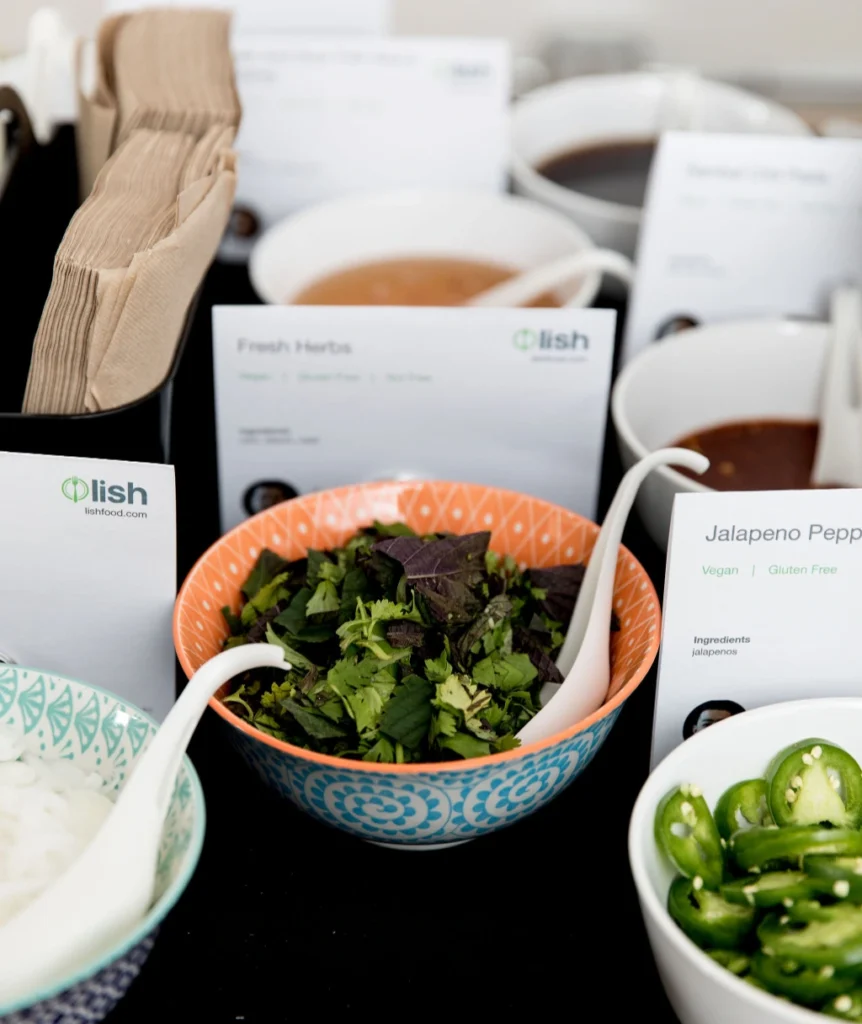
Budgeting Without the Stress
Cost-Efficient Strategies for Corporate Catering
Keeping corporate catering cost-effective without sacrificing quality is entirely possible with some strategic measures:
- Volume Discounts: Larger orders often benefit from economies of scale, so it’s worth asking if there are discounts available for larger groups or recurring catering needs. Favorable terms may be available with a multi-month contractual commitment.
- Simplify the Menu: Instead of offering an expansive array of options, an experienced caterer can help simplify your menu with a few universally appealing and cost-effective dishes.
- Streamline Service: Opt for family-style buffets over boxed lunches to reduce packaging requirements, or evaluate if taking care of set-up or cleanup on your own can save money.
- Limit High-Cost Items: Substitute expensive meat and seafood options with equally satisfying vegetarian or poultry dishes that are often less costly. Providing your own beverages can avoid high markups.
- Alternate the Occasion: Breakfast, happy hour, desserts, or a late afternoon refuel are often occasions that can be lower cost per head, while still being valued by employees.
- Avoid Last-Minute Orders: Advance planning can help you avoid rush charges and gives you the leverage to negotiate better rates.
- Schedule Outside Peak Hours: Everyone expects lunch ready by noon, but you may be able to get a discount by shifting your eating time a bit earlier or later so that caterers can more efficiently schedule their delivery personnel.
By implementing these smart strategies, you can manage a delightful corporate catering experience that aligns with your budgetary constraints.
Understanding the Pricing of Corporate Catering Services
When it comes to understanding the pricing of corporate catering services, transparency is key. To ensure that you’re getting a fair deal, consider these elements:
- Per-Person Cost: Many caterers price their services on a per-person basis, which generally includes the cost of the food, labor, and other service-related charges.
- Per-Item Pricing: Understand the type of pricing and whether it’s a fixed cost per person, or a price that varies per menu item. Fixed costs are simpler to budget, but pricing per item or per catering tray can offer more flexibility and variety.
- Menu Complexity: The sophistication of the menu items can drive costs up. Specialty ingredients and complex dishes require more time and skill to prepare.
- Additional Costs: Be aware of hidden or additional fees such as setup and teardown, gratuities, delivery, and equipment. These can add up and should be factored into the overall estimate.
- Delivery Logistics: Dropping food at a doorstep is downright easy compared to getting into some office buildings. Talk through what you expect and the cost of any service hours.
As a general rule, corporate catering budgets typically start at a minimum of $15 per person before delivery costs and fees. High-end budgets often double that amount. An informed understanding of catering prices helps you budget effectively and ensures you get quality service and delicious food.
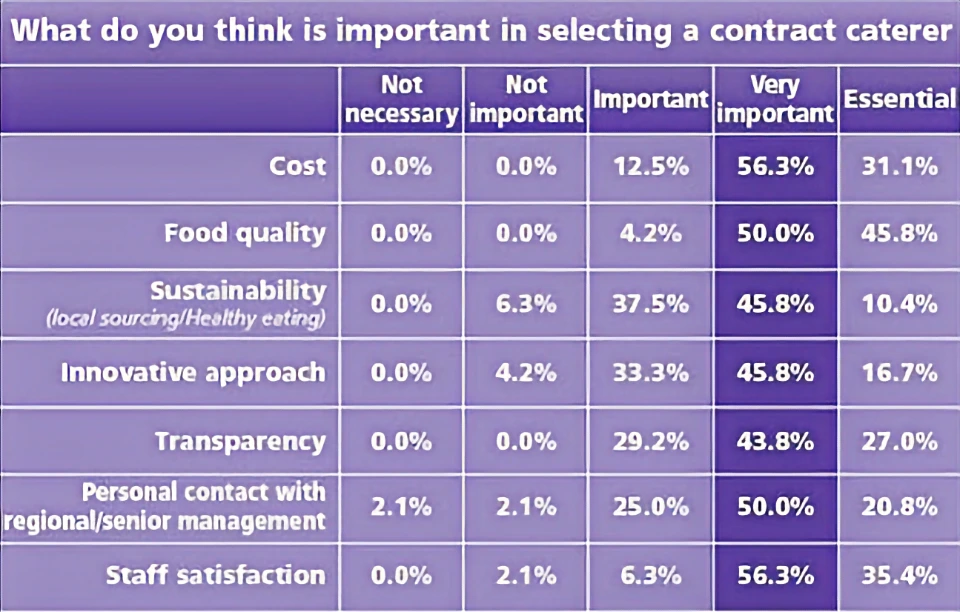
Catering cost is rated as “very important” by 56.3% of facilities managers.
–FMLink, Survey Results on Workplace Catering Operations
Logistics: Setting the Table for Success
Timeliness and Flexibility in Corporate Catering
The importance of timeliness in catering for a fast-paced corporate environment cannot be overstressed. Timely delivery is crucial not just for employee’s schedules but also for maintaining food quality and safety.
Flexibility is equally important. Caterers should be equipped to handle last-minute changes or special requests. This could mean adapting to a sudden increase in attendees, modifying the menu due to dietary restrictions, or changing the time or location of food delivery. Ideally, they should be easily reachable through various communication channels such as their website, email, text, or phone.
A catering vendor who scores high on both fronts—timeliness and flexibility—can significantly enhance your experience, ensuring that your workday proceeds without a hitch.
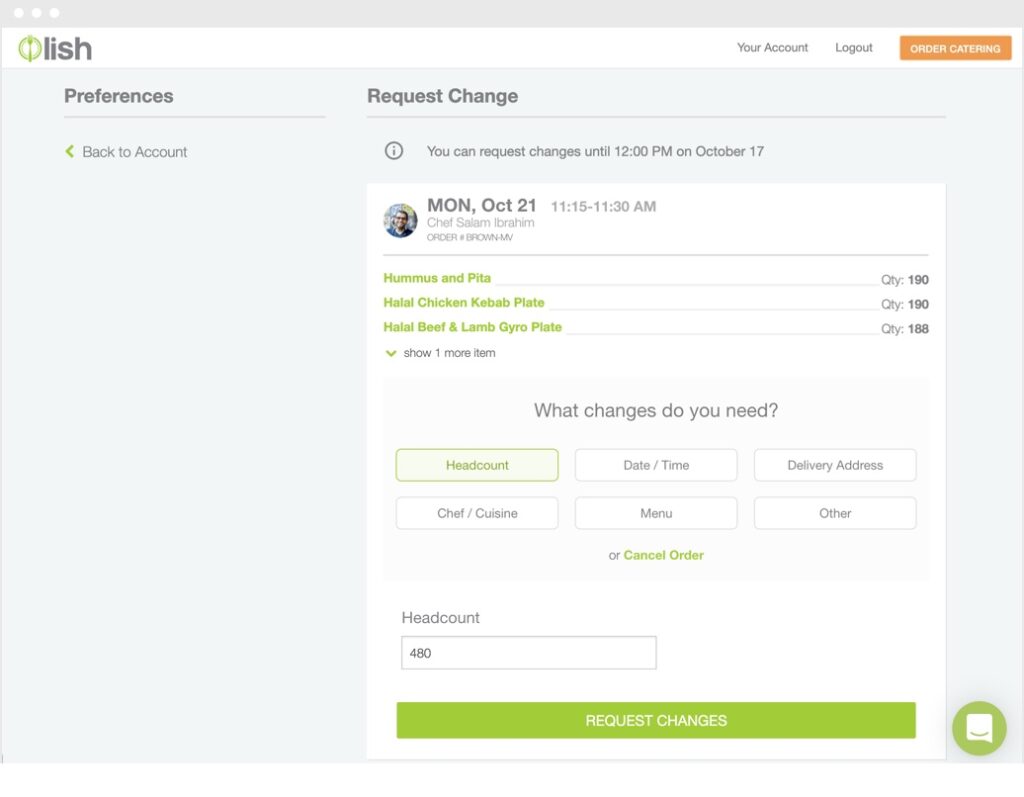
Ensuring Seamless Execution on the Day of the Event
The day of the event is showtime, and ensuring seamless execution of catering services is paramount. Here’s what to keep an eye on:
- Align on Expectations: Ensure clarity on your catering team’s roles and responsibilities and confirm they understand the event’s flow. Talk over details of catering requirements like plates, napkins, and chafing dishes since situations often vary.
- Efficient Setup: Make sure the event space location is clear and arranged for an efficient setup that can serve guests without creating congestion. Two-sided buffet tables work best.
- Plan for your Headcount: If you have a large group, have a plan for how people will be served. Staggering start times, making multiple buffet lines, and refreshing pans as they run low on food are key for a crowd!
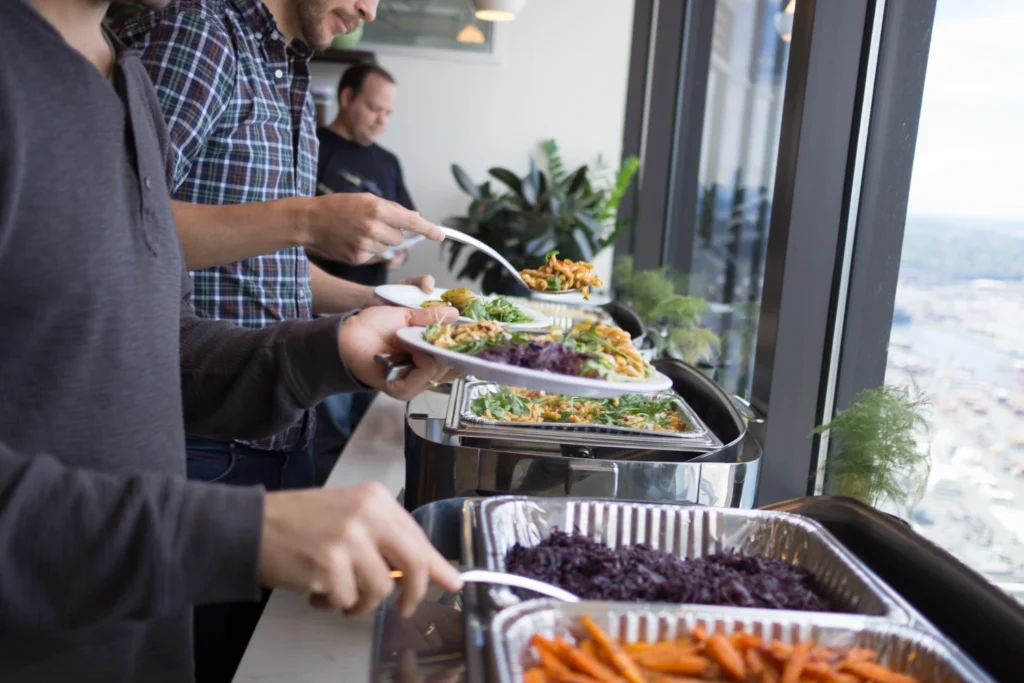
Trends in Corporate Lunch Catering
1. Technology Integration: Streamlining the Experience
Integrating technology into corporate catering services has been a game-changer for streamlining the experience. Online ordering platforms allow for convenient menu browsing, customization of orders, and real-time tracking of delivery — making the entire process far more efficient.
Catering service providers like Lish add even more options. You can integrate your catering schedule directly into your employee’s work calendar, or post upcoming menus on Slack and let people rate their food. Advanced personalization and menu planning technology automatically learns what your team loves, and uses this to plan menus, or to allow employees to choose what they want to eat. Enterprises often value data analytics, budgeting reports, and invoicing integrations available through such providers.
Incorporating tech solutions into the catering strategy is a big leap towards a more personalized and responsive service. By marrying the age-old tradition of hospitality with the innovative possibilities of modern technology, employee engagement and service quality can reach new heights.
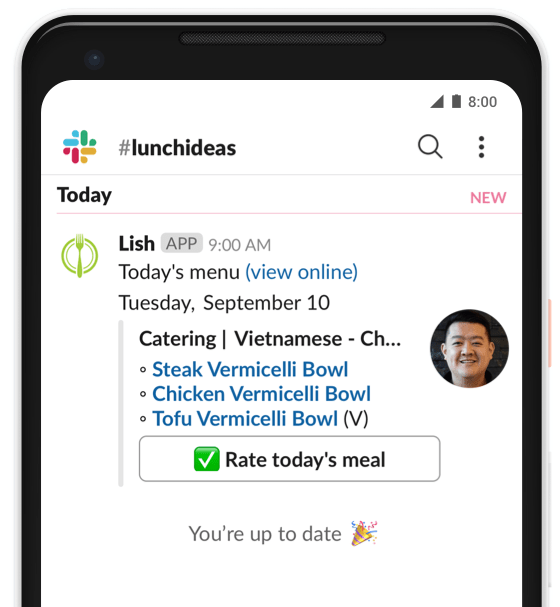
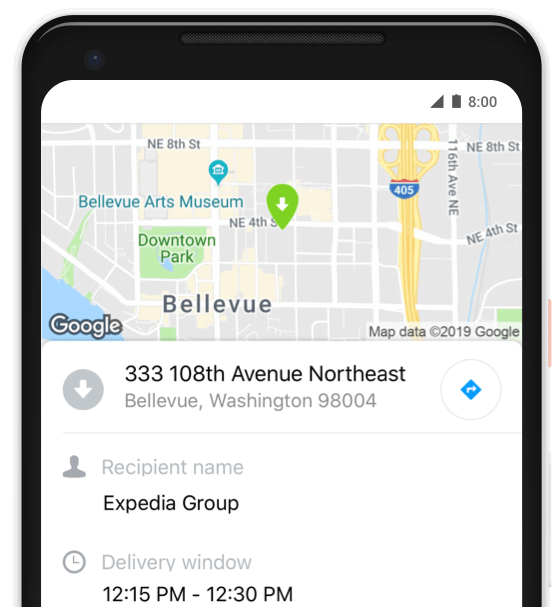
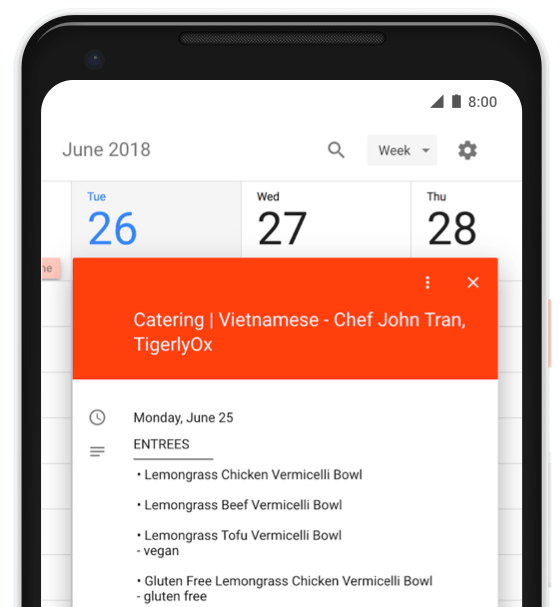
2. Supporting Independent and Local Businesses
Supporting independent and local catering businesses, chefs, and restaurants can bring a host of benefits to your corporate event. When you partner locally, you’re also contributing to the local economy and fostering community connections.
Local caterers often offer unique, culturally rich culinary experiences that can add a special touch to your event and make it stand out. They tend to be more personal and hands-on in preparation, ensuring attention to detail and a level of customization that larger institutions cannot match.

3. Sustainably Served: Embracing Eco-Friendly Practices
Embracing eco-friendly practices in corporate catering goes beyond just serving delicious food—it’s about making a statement that your company cares for the planet. Here are some ways to show this commitment:
- Compostable or Reusable Serving Ware : Instead of single-use plastics, opt for compostable or reusable utensils and plates. This simple switch significantly reduces waste. At Lish we use recyclable, reusable, or compostable goods wherever possible, and offer a partnership with Bold Reuse for offices prioritizing fully reusable solutions.
- Leftover Donation: Partner with organizations who accept food donations, or let employees take home leftovers. Our Lish Cares donation program donates more than 1,200 meals per month to Seattle community organizations.
- Waste Minimization: Work with your caterer to plan proper portion sizes, and plan to compost leftovers that need disposal.
- Locally-Sourced Ingredients: Choose caterers who prioritize local and organic ingredients. This supports local farmers, cuts down on transportation emissions, and usually means fresher, more flavorful food.
By implementing these sustainable practices, you align with the rising tide of environmental responsibility, reflecting positively on your company’s brand while contributing to lasting change.
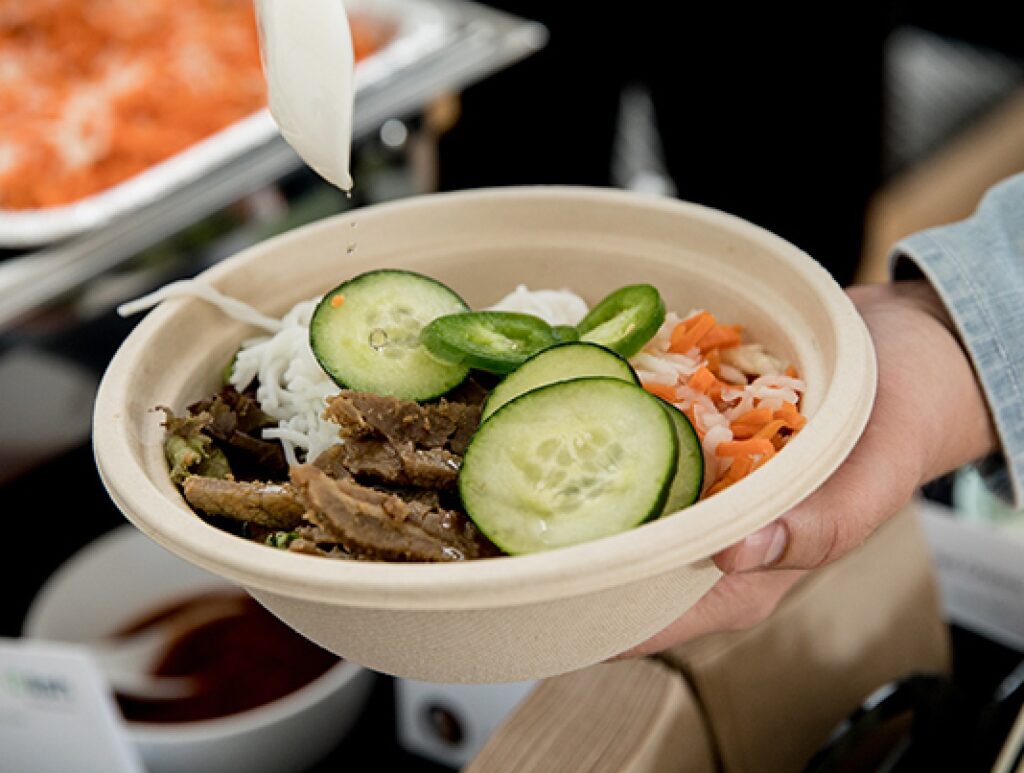
Conclusion: Putting it All Together
Recap of Key Points in Corporate Catering Planning
In our journey to simplify corporate catering, we emphasized the importance of meticulous menu planning, understanding dietary restrictions and preferences, and curating well-designed meal options for breakfast, lunch, and dinner that cater specifically to a corporate audience. We also touched on the significance of offering variety to keep employees engaged.
At the end of the day, the food at a corporate event makes or breaks the experience, but the necessity for timeliness in delivery and smooth setup are table-stakes. Event planning intricacies, including proper estimation of food quantities and inclusion of a range of food options, are also critical to ensure everyone’s needs are met.
By utilizing the expertise of reputable caterers, you can alleviate the pressure of organizing and focus on other mission-critical tasks.
Working with Lish for Corporate Catering
Corporate catering doesn’t need to be a hassle. Let Lish handle the logistics — whether it’s putting your catering on autopilot, working with our catering experts for a corporate event, or treating your office to happy hour.
Through careful preparation and partnership, your corporate catering can be transformed from a stress-inducing task to a seamless, enjoyable experience!
Get started today and see how Lish can elevate your corporate catering experience.
Thank You
Thanks for contacting us!
If you need a meal in the meantime, please head to our ordering page.
Order OnlineThank You
Thanks for scheduling with us! We’re looking forward to talking with you. If you need a meal in the meantime, head to our ordering page.
Order Online
